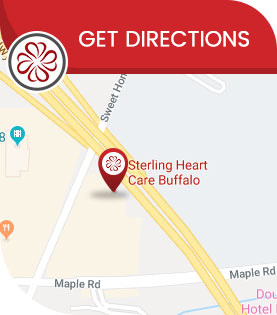Why Does Dyspnea Occur in Heart Failure?
Do you experience breathing problems or pressure in your chest? Heart failure occurs when the heart cannot adequately pump blood around the body. The problem of dyspnea in heart failure is chronic and gets worse if it is not managed. At Sterling Heart Care, Dr. Leon Levinsky treats dyspnea caused by heart failure. Shortness of breath occurs when blood returns to the vessels and returns blood from the lungs to the heart. Due to heart failure, blood does not pump as a result of leakage of fluid in the lungs causing difficulties in breathing. For more information, contact us or visit us online to book an appointment. We are located at 4330 Maple Rd, Buffalo, NY 14226.


Table of Contents:
Why does heart failure cause dyspnea?
What type of heart failure causes dyspnea?
Is dyspnea a serious health condition?
What is the most common cause of dyspnea?
Dyspnea, also known as shortness of breath, most often occurs with physical activity and excretion. However, it can also be a symptom of an underlying heart condition which is why it’s important to take note of when, where, and how often it’s happening. Heart disease and congestive heart failure, in particular, have dyspnea as a common symptom.
At Sterling Heart Care, we prioritize your heart health ensuring that you get care when and where you need it. If you’ve been diagnosed with heart failure, or have a heart condition that’s resulting in disruptive dyspnea, contact us today or book in online to schedule an appointment. We can help you navigate heart concerns and can customize a treatment plan for your unique condition.
Heart failure causes the heart to malfunction, causing oxygenated blood from the lungs to back up in the veins as it attempts to move towards the heart. As a result, fluid pools in the lungs, interfering with normal breathing patterns and making it difficult to breathe. The result of this is dyspnea, also known as shortness of breath.
This condition presents during exercise and physical activity but, as your heart condition worsens, it may also start to occur when you’re at rest or sleeping.
Shortness of breath can leave you feeling panicky, exhausted, and anxious which is why it’s important to talk to your healthcare provider about how to manage your symptoms.
Heart failure can occur in the right or left ventricle, and the type of heart failure you have will often dictate what type of symptoms you’ll encounter.
Dyspnea can be caused by both types of heart failure, however, it is more common in with conditions affecting the left ventricle. Left-sided heart failure can be systolic (where the ventricle can’t contract normally) or diastolic (where the heart chamber is stiffer and can’t relax properly). Both cause blood to back up in the blood vessels, causing liquid to pool in the lungs, which can result in difficulty breathing.
It’s common for people with left-sided heart failure to first start having breathing problems only when they’re doing physical activity. Over time, however, they’ll usually begin to notice more difficulty breathing even when sleeping or at rest.
While periodic shortness of breath, such as that experienced when exercising, is completely normal, difficulty breathing on a more consistent or regular basis can be indicative of a more severe medical problem.
Shortness of breath not associated with physical exertion is often a symptom of heart and lung problems. However, it can also be a sign of more moderate conditions such as allergies, asthma, anxiety, panic attacks, and colds.
While dyspnea on its own isn’t usually fatal or dangerous, it may be a sign of a life-threatening condition.
You should contact 911, or go to the nearest emergency room immediately, if you’re experiencing shortness of breath that coincides with:
– A high fever
– Blue skin, lips, or nails
– Breathlessness that lingers even after rest
– Chest pain
– Chest pressure
– Heart palpitations
– Not being able to catch your breath, even when resting or sleeping.
– Stridor or wheezing when breathing.
– Sudden and significant difficulty breathing
– Swollen ankles or feet (edema).
Shortness of breath (dyspnea) is a very common condition that can be caused by numerous internal and external factors. Diagnostic testing, such as blood tests, chest X-rays, electrocardiograms (EKGs), are often required to pinpoint what, exactly, is causing the problem.
The most common causes of dyspnea are:
– Allergies
– Anemia
– Anxiety
– Asthma
– Being overweight
– Exercising and physical exertion
– Heart conditions (such as heart disease and heart failure)
– Lung conditions
– Panic attacks
– Respiratory infections
– Smoking
When you need professional insight into what’s causing your dyspnea or how to manage it effectively, you can trust the professionals at Sterling Heart Care to get you the answers you need. Our team is extremely knowledgeable and professional, dedicated to providing you the exceptional care you need to safeguard your health. Contact us today for more information about our dyspnea treatment services or book in online an appointment. We are located at 4330 Maple Rd, Buffalo, NY 14226. We serve patients from Buffalo NY, Pine Hill NY, Sloan NY, Kenmore NY, Cleveland Hill NY, Kaisertown NY, and surrounding areas.

Additional Services You May Be Interested In
▸ECP For Heart Disease
▸ECP Therapy For Circulation
▸ECP Therapy For Athletes
▸History of ECP
▸ECP Therapy
▸Cardiac Rehabilitation Services
▸ECP Treatment Center Near Me
▸Cardiovascular Disease Treatment in Buffalo, NY
▸Heart Disease Treatment in Buffalo, NY
▸ECP Therapy Near Me Cheektowaga, NY
▸Cardiac Rehab Program
▸Stress Management Specialist

Additional Services You May Be Interested In
▸ECP For Heart Disease
▸ECP Therapy For Circulation
▸ECP Therapy For Athletes
▸History of ECP
▸ECP Therapy
▸Cardiac Rehabilitation Services
▸ECP Treatment Center Near Me
▸Cardiovascular Disease Treatment in Buffalo, NY
▸Heart Disease Treatment in Buffalo, NY
▸ECP Therapy Near Me Cheektowaga, NY
▸Cardiac Rehab Program
▸Stress Management Specialist


